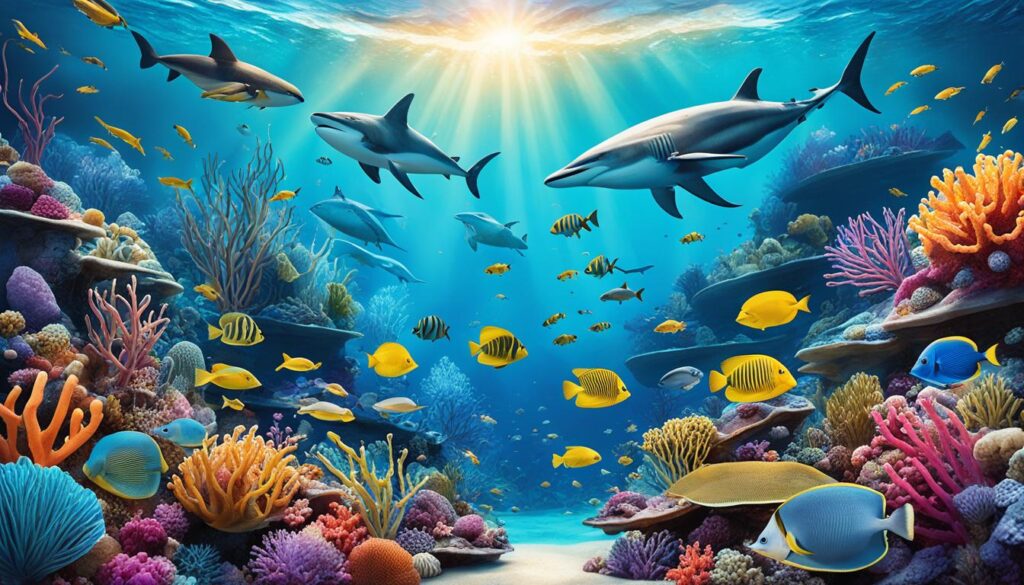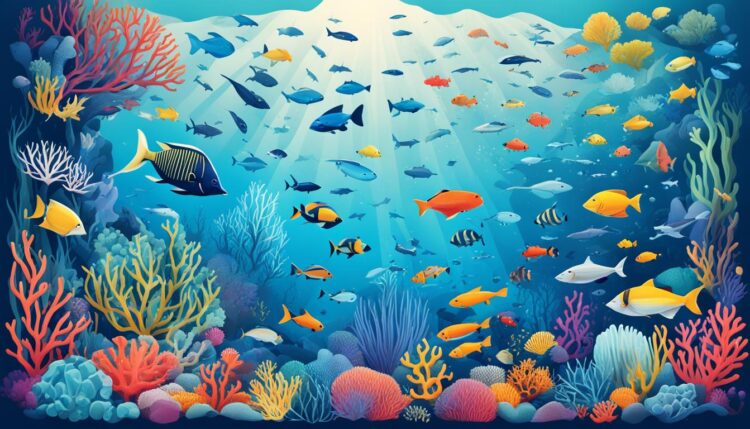Exploring marine ecosystems unveils a complex interplay of species and habitats that forms the foundation of ocean life. This harmonious diversity is essential to both marine biology and ocean conservation efforts. The European Union recognizes the intrinsic link between the health of marine environments and the well-being of human populations, emphasizing the need for sustainable practices and marine habitat diversity.
Marine ecosystems, ranging from vibrant coral reefs to the deepest ocean trenches, support an incredible variety of life. These ecosystems underpin a vast array of ecosystem services that are vital to life on Earth and the global economy. Understanding and conserving this diversity is crucial for the continued prosperity of both marine life and human livelihoods.
Key Takeaways
- Marine ecosystems consist of intricate relationships between various species and habitats.
- The health of marine environments is closely linked to human well-being.
- Sustainable practices and conservation efforts are vital for ocean conservation.
- Diverse marine habitats, like coral reefs, are critical for ecosystem services.
- Understanding marine biology is essential for maintaining marine biodiversity.
Introduction to Marine Ecosystems
Marine ecosystems encompass a fascinating array of habitats that play a critical role in sustaining a vast diversity of marine species. These ocean ecosystems are indispensable for global health and economic prosperity. By regulating the climate, generating oxygen, and providing food resources, marine ecosystems support countless forms of life, both underwater and on land.
A key aspect of marine ecology is understanding how these various elements interact to maintain the delicate balance that sustains life. Ocean ecosystems include coral reefs, mangroves, estuaries, and open oceans, each offering unique contributions to our planet’s wellbeing. These ecosystems harbor numerous marine species, many of which are yet to be discovered, making the study of marine ecology a continuously evolving field.
In addition to their ecological importance, marine ecosystems provide essential services that are vital for human livelihoods. This includes climate regulation through carbon sequestration and oxygen production, as well as supporting industries like fisheries and tourism. The rich biodiversity found within these ecosystems not only enriches the planet but also offers potential pharmaceutical benefits as new marine species are studied.
The Importance of Biodiversity in Marine Ecosystems
Marine ecosystems play a pivotal role in supporting biodiversity. They provide habitats for a multitude of species, which in turn drive the health and productivity of our oceans. The preservation of these habitats is essential for marine biodiversity conservation, ensuring a balance in ecological services and the wellbeing of coastal communities.
Coral Reefs as Biodiversity Hotspots
Coral reefs are often termed the rainforests of the sea due to their rich biodiversity. These ecosystems are home to vibrant communities of marine species. However, they are highly sensitive to environmental changes, leading to coral bleaching and subsequent loss of marine life. Protecting these hotspots is crucial for maintaining ecosystem resilience and supporting marine biodiversity conservation.
Impact on Marine Life and Human Livelihoods
The decline in biodiversity has far-reaching consequences not only for marine life but also for human livelihoods. Coastal communities, particularly those dependent on fisheries and tourism, are significantly affected. Loss of species reduces ecosystem resilience, which compromises the ocean’s ability to sequester carbon, exacerbating climate change. Marine biodiversity conservation, therefore, is not just about preserving marine life but also about sustaining human economies and cultures.
| Marine Ecosystem Component | Role in Biodiversity | Impact on Human Livelihoods |
|---|---|---|
| Coral Reefs | Provide habitat for a variety of marine species | Support fisheries and tourism industries |
| Seagrass Beds | Nurture juvenile fish and invertebrates | Protects coastlines and promotes eco-tourism |
| Open Oceans | Support pelagic species and migration routes | Crucial for commercial fishing operations |
Coral Reefs: The Rainforests of the Sea
Coral reefs, often likened to the rainforests of the sea, are some of the most vibrant ecosystems on Earth. These underwater marvels showcase remarkable coral biodiversity, supporting an extensive array of marine life. The health of a coral reef is a robust indicator of marine ecosystem health; however, their vibrancy and vitality face constant challenges.
The primary threat to these ecosystems is coral bleaching, caused by changes in ocean temperature and acidity. When water conditions are unfavorable, corals expel the symbiotic algae living in their tissues, which leads to the white, “bleached” appearance. This phenomenon not only makes the corals more susceptible to disease but also disrupts the entire ecosystem relying on the reef.
Furthermore, coral biodiversity is crucial as it ensures ecological resilience. A diverse coral population can withstand and recover from environmental stresses more effectively, maintaining the balance and ensuring that the reef continues to provide essential services to marine life and human communities alike. Protecting these natural treasures from threats like coral bleaching and promoting marine ecosystem health is imperative for preserving their ecological and economical value.
Marine Pollution and its Effects
Ocean pollution is causing significant damage to marine ecosystems, resulting in both immediate and long-term effects on marine habitat degradation. It is essential to understand the primary pollutants affecting the ocean and their impacts on marine life and human health.
Plastic Pollution
Plastic pollution is one of the most pervasive issues in ocean health. Marine animals, from birds to fish and even marine mammals, often ingest plastic debris, mistaking it for food. This ingestion can lead to physical harm or death. Furthermore, marine habitat degradation is exacerbated when plastics break down into microplastics, which infiltrate the food chain.
“Plastic debris ingestion and entanglement in the ocean’s fauna are critical issues that need immediate attention.”
Efforts to curb plastic pollution require a global commitment to reducing plastic waste at the source and enhancing recycling initiatives.
Chemical Contaminants
Chemical contaminants, including heavy metals and toxic substances, pose a severe threat to marine ecosystems. These pollutants often originate from industrial activities, agricultural runoff, and improper waste disposal. Once in the ocean, these chemicals can accumulate in marine organisms, leading to toxicity that affects the entire food web.
- Heavy metals such as mercury and lead can cause neurotoxicity in marine life.
- Pesticides and herbicides disrupt reproductive systems of marine organisms.
- Persistent organic pollutants (POPs) can resist environmental degradation and remain in the ecosystem for extended periods.
The concentration of these toxic substances in marine species can lead to significant health risks for humans, particularly those reliant on seafood as a primary food source.
| Pollutant | Source | Effect on Marine Life | Human Health Risk |
|---|---|---|---|
| Plastic | Consumer Waste | Ingestion and Entanglement | Food Chain Contamination |
| Heavy Metals | Industrial Discharges | Neurotoxicity | Mercury Poisoning |
| POP’s | Pesticides | Reproductive Disruption | Cancer Risk |
Addressing the problem of ocean pollution requires stringent regulations, clean-up initiatives, and effective public awareness campaigns to mitigate its effects on marine habitat degradation and protect both marine and human life from toxic substances.
Climate Change and Marine Ecosystems
Climate change is dramatically reshaping the marine ecosystems through significant atmospheric and oceanic alterations. Both ocean warming and ocean acidification present critical challenges that threaten the stability of these ecosystems.
Ocean Warming
Ocean warming is a direct consequence of increased atmospheric temperatures. This phenomenon exacerbates climate impacts on oceans, leading to the deoxygenation of waters, which severely affects marine life. Warmer oceans disrupt the distribution of marine species, pushing some to migrate towards cooler areas, while others may face extinction.
Ocean Acidification
With rising greenhouse gas regulation challenges, ocean acidification has become a pressing issue. The ocean’s absorption of excess carbon dioxide results in higher acidity levels, impairing the process of oceanic carbon sequestration. This leads to the deterioration of coral reefs and other calcium carbonate-dependent marine organisms, putting crucial biodiversity and ecosystems at risk.
The detrimental effects of both ocean warming and acidification highlight the urgent need for comprehensive greenhouse gas regulation to mitigate further damage.
Marine Biodiversity and Ecosystem Services
Marine biodiversity is fundamental to the ecosystem services that support human societies and economies. The diversity within marine life contributes to vital functions, including climate regulation, provisioning of food, and oxygen production. Effective management and conservation of this biodiversity are paramount for achieving sustainable development goals.

Healthy marine ecosystems provide multiple oceanic services crucial for human well-being. These services encompass:
- Climate Regulation: Oceans absorb significant amounts of CO2, mitigating climate change effects.
- Food Resources: Marine life forms a substantial part of global food sources, particularly in coastal regions.
- Oxygen Production: Marine phytoplankton contributes to half of the planet’s oxygen supply.
- Recreational Benefits: Oceans offer recreational and tourism opportunities that support economies.
To effectively maintain these benefits and promote sustainable development, concerted efforts in managing and preserving marine biodiversity are essential. Such efforts are integral to fulfilling Sustainable Development Goal 14: Life Below Water. This goal emphasizes the need for protecting marine resources and ensuring their sustainable use for future generations.
| Ecosystem Services | Importance to Humans |
|---|---|
| Climate Regulation | Mitigates climate change through CO2 absorption |
| Food Resources | Provides substantial seafood for global consumption |
| Oxygen Production | Contributes to over 50% of global oxygen supply |
| Recreational Benefits | Supports tourism and recreational industries |
Human Impact on Marine Biodiversity
The influence of human activities on marine biodiversity is profound and multifaceted. Anthropogenic effects, such as habitat destruction, pollution, and overfishing, are leading to significant changes in marine environments. These actions stress marine species and habitats, potentially causing irreversible changes.
Understanding the extent of these anthropogenic effects is crucial for effective marine ecosystem management. Habitat destruction, primarily from coastal developments, leads to the loss of breeding grounds for many marine species. Pollution, particularly from plastics and chemicals, further exacerbates the situation by contaminating water and marine life.
Overfishing, a critical issue, depletes key species, disturbing the balance of marine ecosystems. Effective marine ecosystem management must address these challenges to ensure the sustainability of marine biodiversity. Additionally, ocean conservation efforts are essential to mitigate these impacts and preserve marine life.
| Human Activity | Impact on Marine Biodiversity |
|---|---|
| Habitat Destruction | Loss of breeding grounds and critical habitats |
| Pollution | Contamination of water and marine species |
| Overfishing | Depletion of key species and ecosystem imbalance |
To combat these issues, ocean conservation strategies must be implemented. Developing comprehensive marine ecosystem management policies can help reduce the pressures on marine biodiversity, ensuring healthier, more resilient marine environments.
Preservation and Conservation Efforts
Global efforts to preserve and conserve marine ecosystems are paramount in safeguarding the health and diversity of our oceans. These efforts include establishing Marine Protected Areas (MPAs) and implementing comprehensive marine environmental policies. Such conservation initiatives are critical for maintaining both biodiversity and ecological balance amidst increasing threats from pollution and climate change.
Marine Protected Areas
Marine Protected Areas (MPAs) serve as safe havens for marine life, where human activities are managed and sometimes restricted to ensure minimal impact on the environment. MPAs play a crucial role in ecological preservation by providing spaces where ecosystems can thrive without the pressures of overfishing, habitat destruction, and pollution. Countries around the world, including the United States, are expanding their network of MPAs to create a robust framework for marine conservation.
Policy and Regulation
Effective marine environmental policy is essential for addressing the myriad challenges facing our ocean ecosystems. Governments and organizations globally are introducing policies aimed at reducing pollution, particularly plastic waste, and regulating fishing practices to prevent overexploitation of marine resources. The commitment to international agreements, such as historic resolutions to end plastic pollution by 2024, exemplifies the dedication to sustainable conservation initiatives. These regulations not only protect marine biodiversity but also ensure the productivity and sustainability of the oceans for future generations.












